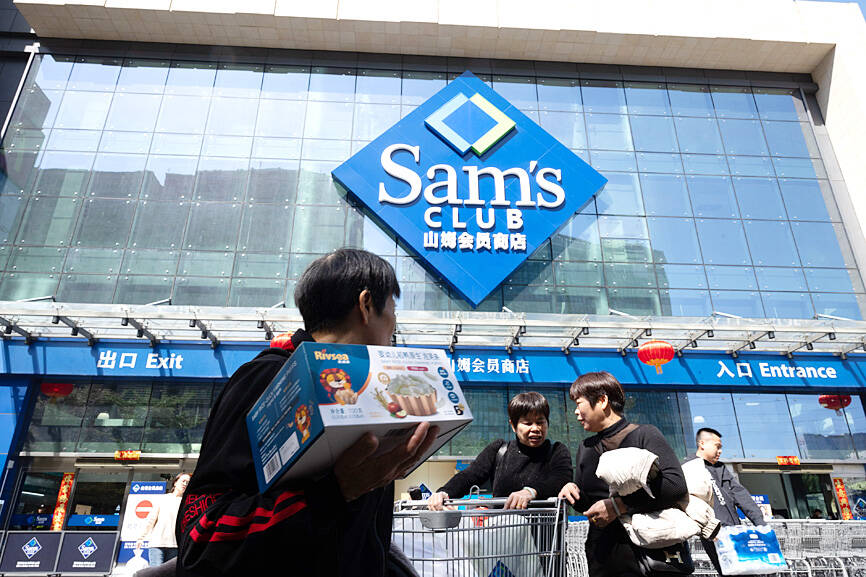Hong Kong became a ghost town during the Easter holiday as residents made a record number of trips out of town — particularly to mainland China — leaving bar strips and shopping hotspots empty.
A total of 9.3 million departures from the territory of 7.3 million people occurred last month. It was the single-highest monthly number since at least 1997, government data showed.
The exodus continued through the four-day Easter holiday that ended on Monday, when total Hong Kong resident departures for Macau and mainland China was 10 percent higher than in 2019, the data showed.

Photo: Bloomberg
This year’s Easter tourist arrivals in Hong Kong from mainland China and Macau plunged 46 percent from the 2019 period.
The great departure underscores the challenges facing the once vibrant financial center that has seen a large swath of its professional workers relocate to other countries, a diminished entertainment sector and soaring prices.
The record outflow was largely the result of people heading across the border to the mainland and Macau, where they can enjoy cheaper and a larger variety of entertainment, food and shopping.
Hong Kong residents last month made 8.3 million departures via border checkpoints — another record since at least 1997 — typically used to travel to the rest of China.
Hong Kong is increasingly losing out to nearby Chinese cities including tech hub Shenzhen and casino town Macau as a high-speed rail and a mega cross-sea bridge make cross-border travel faster and easier than ever before.
The financial center is struggling to maintain its appeal in the face of an economic slowdown and weaker yuan.
High Hong Kong rents and limited entertainment offerings — from restaurants to shopping — have pushed up prices and reduced residents’ choices.
Local bars and restaurants are struggling to stay afloat. Dining-in business over the Easter holiday was estimated to have fallen by as much as 40 percent from a year earlier, Hong Kong Federation of Restaurants and Related Trades president Simon Wong (黃家和) said on a local radio program on Monday.
A Facebook group about Hong Kong stores shutting down has attracted 186,000 members, with users posting photographs of shuttered outlets, empty shops and going-out-of business announcements.
Even Hong Kong’s tycoon-owned supermarket chains, such as CK Hutchison Holdings Ltd’s (長江和記實業) ParknShop and Jardine Matheson Holdings Ltd’s (怡和控股) Wellcome, are facing increasing pressure as they rework strategies to provide people with more choices.
State-owned conglomerates China Resources Holdings Co (華潤集團) and Dah Chong Hong Holdings Ltd (大昌行集團) — the territory’s biggest food and fast-moving consumer goods distributors — have closed dozens of grocery stores in the past few months.
Travel agencies operating tours to the mainland, on the other hand, are experiencing booming business. Over the Easter holiday, the number of Hong Kong residents signing up for tour groups to other Chinese cities rose three-fold from a year earlier, EGL Tours Co (東瀛遊旅行社) executive director Steve Huen (禤國全) said.

COMPETITION: AMD, Intel and Qualcomm are unveiling new laptop and desktop parts in Las Vegas, arguing their technologies provide the best performance for AI workloads Advanced Micro Devices Inc (AMD), the second-biggest maker of computer processors, said its chips are to be used by Dell Technologies Inc for the first time in PCs sold to businesses. The chipmaker unveiled new processors it says would make AMD-based PCs the best at running artificial intelligence (AI) software. Dell has decided to use the chips in some of its computers aimed at business customers, AMD executives said at CES in Las Vegas on Monday. Dell’s embrace of AMD for corporate PCs — it already uses the chipmaker for consumer devices — is another blow for Intel Corp as the company

STIMULUS PLANS: An official said that China would increase funding from special treasury bonds and expand another program focused on key strategic sectors China is to sharply increase funding from ultra-long treasury bonds this year to spur business investment and consumer-boosting initiatives, a state planner official told a news conference yesterday, as Beijing cranks up fiscal stimulus to revitalize its faltering economy. Special treasury bonds would be used to fund large-scale equipment upgrades and consumer goods trade-ins, said Yuan Da (袁達), deputy secretary-general of the Chinese National Development and Reform Commission. “The size of ultra-long special government bond funds will be sharply increased this year to intensify and expand the implementation of the two new initiatives,” Yuan said. Under the program launched last year, consumers can

TECH PULL: Electronics heavyweights also attracted strong buying ahead of the CES, analysts said. Meanwhile, Asian markets were mixed amid Trump’s incoming presidency Taiwan Semiconductor Manufacturing Co (TSMC, 台積電) shares yesterday closed at a new high in the wake of a rally among tech stocks on Wall Street on Friday, moving the TAIEX sharply higher by more than 600 points. TSMC, the most heavily weighted stock in the TAIEX, rose 4.65 percent to close at a new high of NT$1,125, boosting its market value to NT$29.17 trillion (US$888 billion) and contributing about 400 points to the TAIEX’s rise. The TAIEX ended up 639.41 points, or 2.79 percent, at 23,547.71. Turnover totaled NT$406.478 billion, Taiwan Stock Exchange data showed. The surge in TSMC follows a positive performance

FUTURE TECH: Nvidia CEO Jensen Huang would give the keynote speech at this year’s Consumer Electronics Show, which is also expected to highlight autonomous vehicles Gadgets, robots and vehicles imbued with artificial intelligence (AI) would once again vie for attention at the Consumer Electronics Show (CES) this week, as vendors behind the scenes would seek ways to deal with tariffs threatened by US president-elect Donald Trump. The annual Consumer Electronics Show opens formally in Las Vegas tomorrow, but preceding days are packed with product announcements. AI would be a major theme of the show, along with autonomous vehicles ranging from tractors and boats to lawn mowers and golf club trollies. “Everybody is going to be talking about AI,” Creative Strategies Inc analyst Carolina Milanesi said. “From fridges to ovens